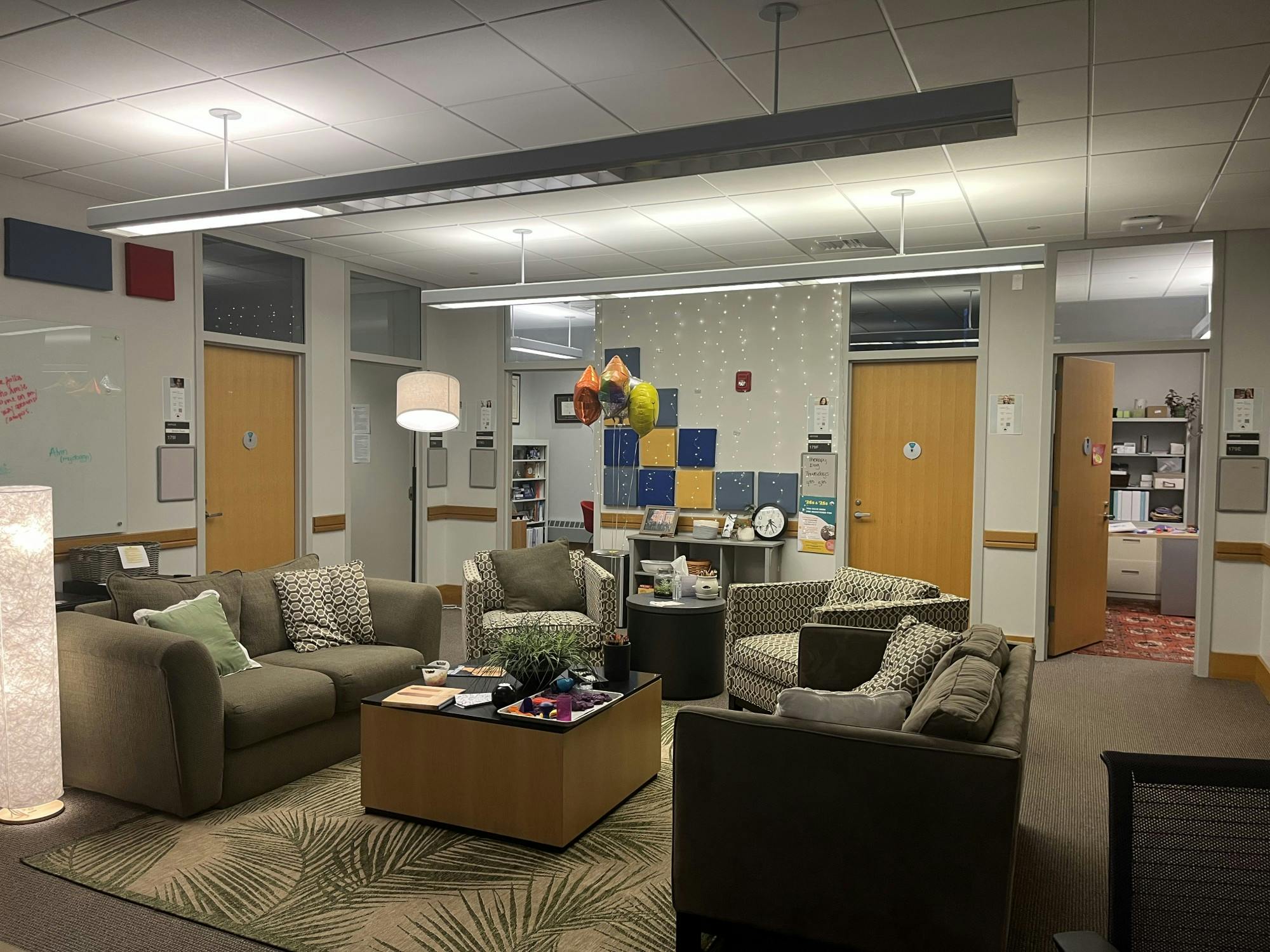The Student Wellness Center and the Academic Skills Center jointly debuted a new location on the first floor of Baker-Berry Library on Jan. 11. The reopening also included the launch of a tranquility room — a wellness-focused space implemented by members of Dartmouth Student Government’s mental health committee.
According to SWC director Caitlin Barthelmes, the tranquility room is meant to provide an “oasis from stress” and will be open on weekdays from 8:30 a.m. to 4:30 p.m. Students are able to use the space either individually or with friends, and the SWC encourages that it be used for 15 minutes at a time to maximize accessibility, Barthelmes said.
“Our hope is that students will walk in and be invited to tailor the room for the time of their use in a way that is most supportive to them,” Barthelmes said.
DSG vice president and mental health committee co-chair Jessica Chiriboga ’24 said that students can customize the room by changing its lighting, the pressure of the massage chair, its smell using a diffuser and the media on the speakers.
As a private space equipped with two massage chairs, yoga mats, blankets, prayer rugs and meditation chairs, the tranquility room is meant to be a place for meditation and relaxation, according to SWC office manager Christiana Fitzpatrick. Barthelmes added that students can use the room’s bluetooth speakers to pair with the meditation app Headspace, which debuted on campus last September.
Barthelmes said that although it has always been a goal of the SWC to create a place where students “feel supported and feel well taken care of,” the specific vision of a tranquility room did not come into fruition until Chiriboga received a $10,000 American Eagle Future Together grant. The grant is organized by American Eagle in partnership with the nonprofit Bring Change to Mind, which seeks to end the stigma of mental illnesses. After receiving the grant in July, Chiriboga said that she approached the SWC with the idea of developing the tranquility room in August, with the DSG joining the efforts in October.
Chiriboga said that she was primarily motivated by the Wellness Center at Duke University, which occupies its own building containing built-in “spaces of reflection and relaxation.” Barthelmes said that DSG and the SWC planned out the space throughout the fall and purchased items and organized the new layout in December and January. DSG Mental Health Committee co-chair Jonathan Pazen ’25 said that the room is “in no way complete.”
“We’ve used about a third of the grant and we have a lot more money available,” Chiriboga said. “We want to use the remaining [funds] on looking into the feasibility of having an outdoor meditation garden somewhere on campus or separately using it to maintain the different things in the tranquility room.”
The debut of the tranquility room also follows the move of the SWC and ASC from their respective former locations in Robinson Hall and Baker-Berry Library to the first floor of Berry library. Barthelmes said that she hopes that the SWC’s new, central location will encourage students to utilize more of its programming — including but not limited to the tranquility room.
“The fact that we’re on the main path of student life in the heart of campus increases the likelihood of utilizing the space and the services,” Barthelmes said.
According to Barthelmes, the SWC’s old offices were smaller and lacked private space for relaxation. The center’s new location in the library offers several private rooms and offices surrounding a central “living room,” making it conducive for relaxation, Fitzpatrick said.
“After you’ve been grinding in the stacks for a couple of hours, you’re able to draw [resources] from there and really relax,” Chiriboga said.
Ultimately, Chiriboga said that she hopes that the tranquility room will promote well-being practices across the student body.
“If [students aren’t] able to make it up into the [tranquility] room, its presence in the Student Wellness Center encourages them to incorporate well-being into their daily practice, whether that’s a walk around Pine Park, or going out ice skating with friends — different ways that they can reflect on their lives and take intentional time for themselves,” Chiriboga said.
The SWC offers other programs that seek to improve the well-being of students in the areas of sexual violence prevention, high-risk drinking prevention and holistic well-being, Barthelmes said. Programming ranges from the Sexual Violence Prevention Project to therapy dogs and yoga nidra, Fitzpatrick added.
Barthelmes noted that within its well-being branch, the SWC focuses on mindfulness, with the goal of equipping students with the skills that can foster “positive outcomes.”
Beyond the tranquility room, DSG’s mental health committee also advocates for students in a “variety of ways,” according to Pazen. DSG well-being projects include creating a virtual map of on-campus mental health resources available through Google Maps, funding five $1,000 grants for student mental health projects and increasing access to sunlamps, Chiriboga said.
In the future, Pazen said that he hopes to see “closer ties” between DSG and wellness organizations such as the Dartmouth Mental Health Union, as well as increased accessibility of mental health resources on campus.
“On campus, there are a lot of resources, but a lot of the time students aren’t necessarily as aware or don’t know how to maximize the usage of these things,” Pazen said.




